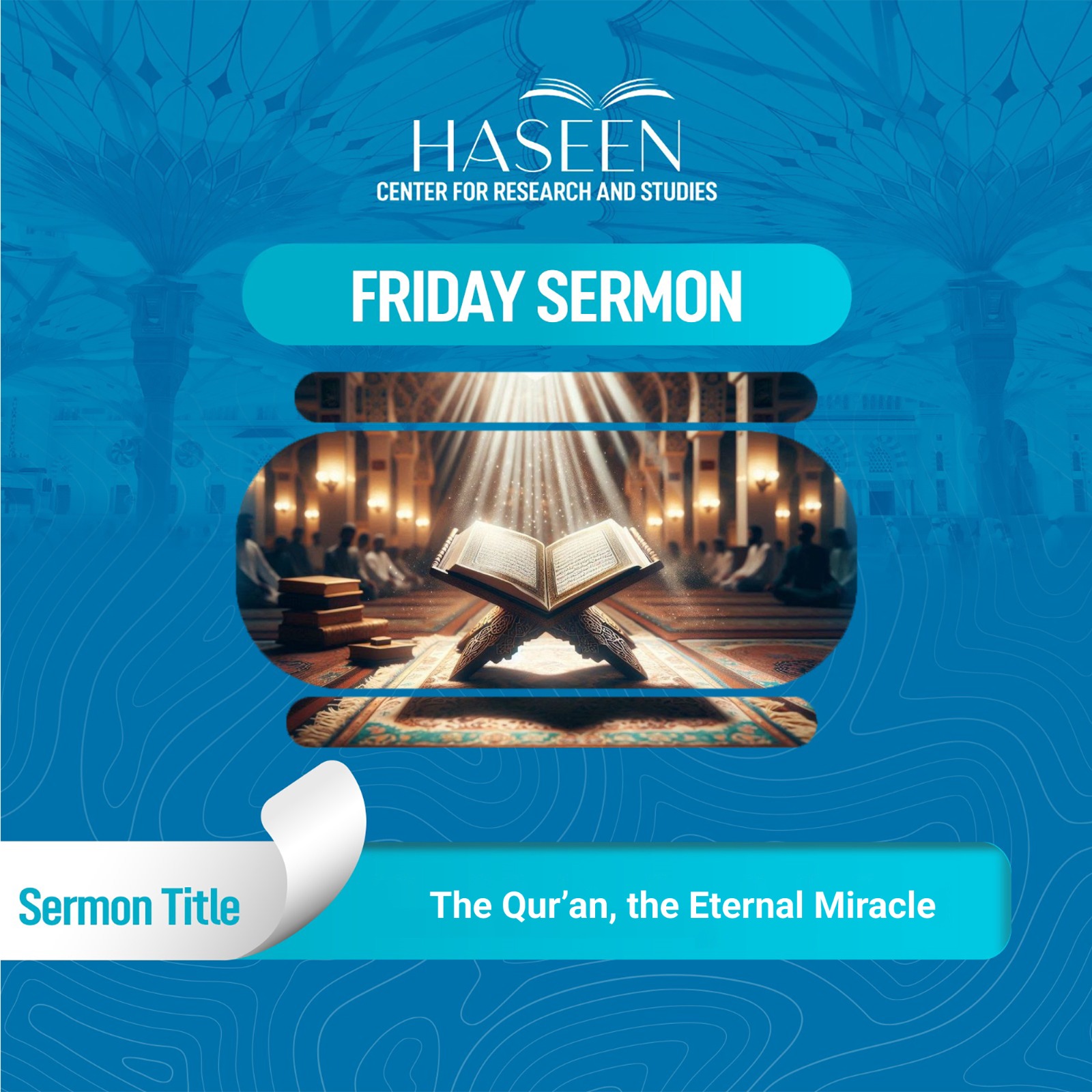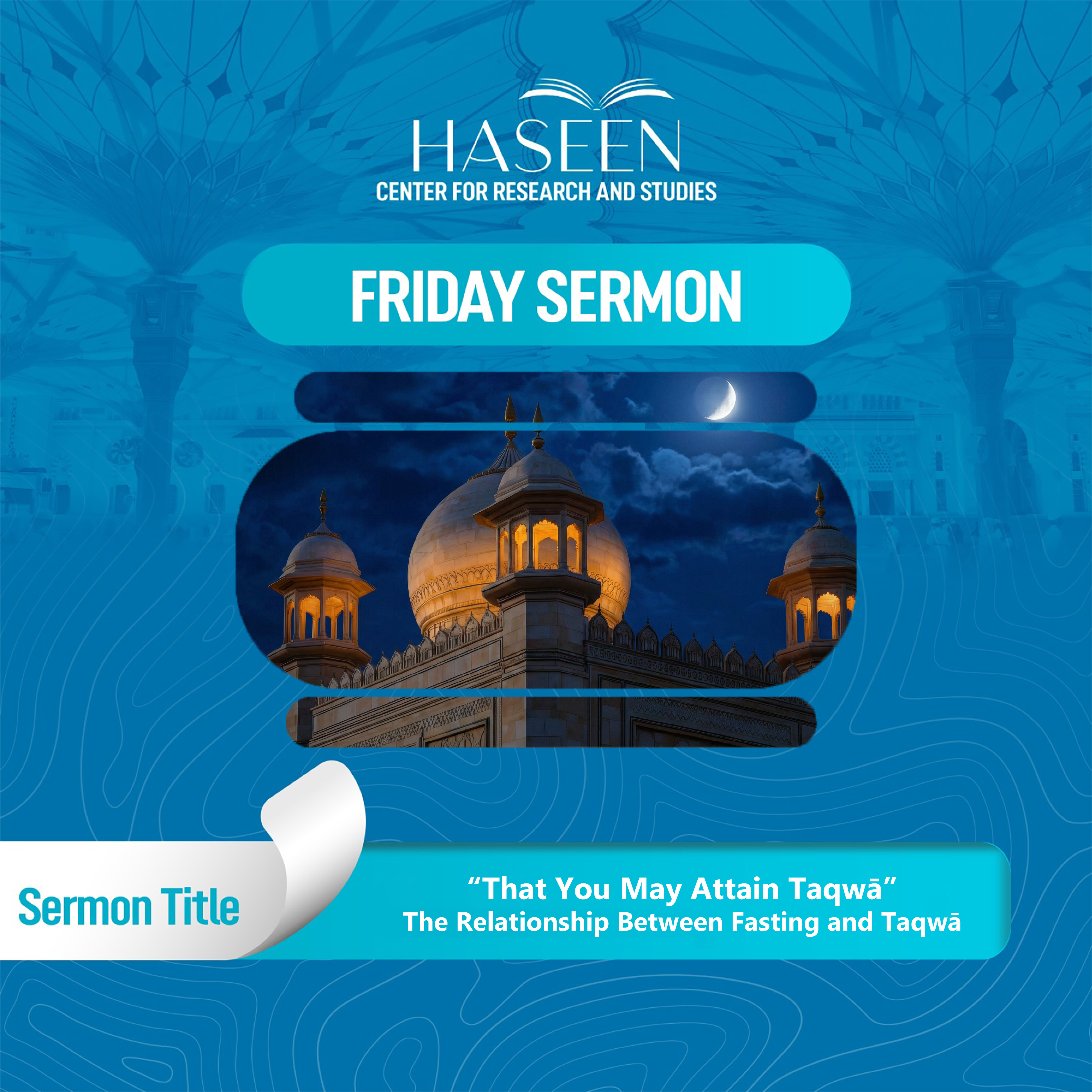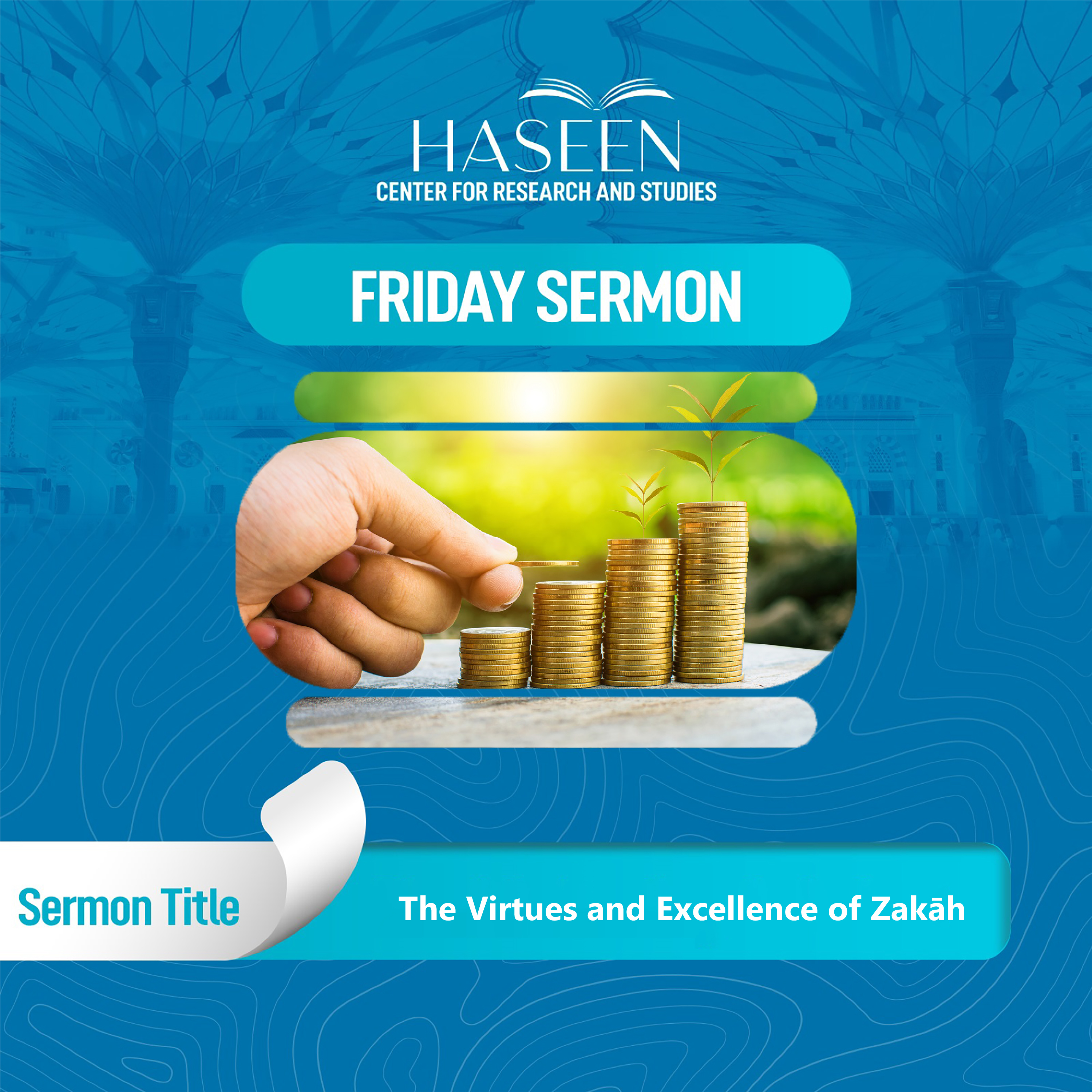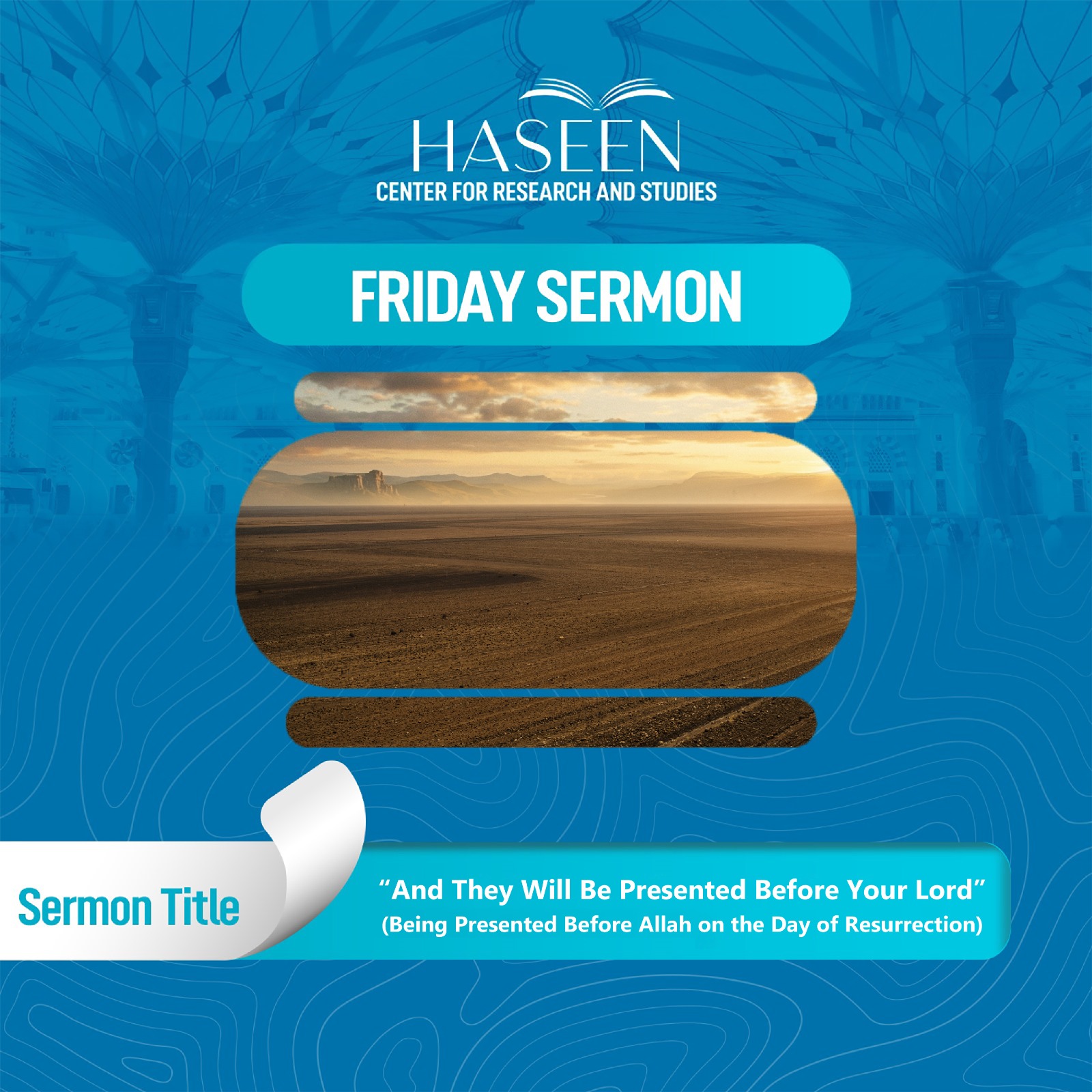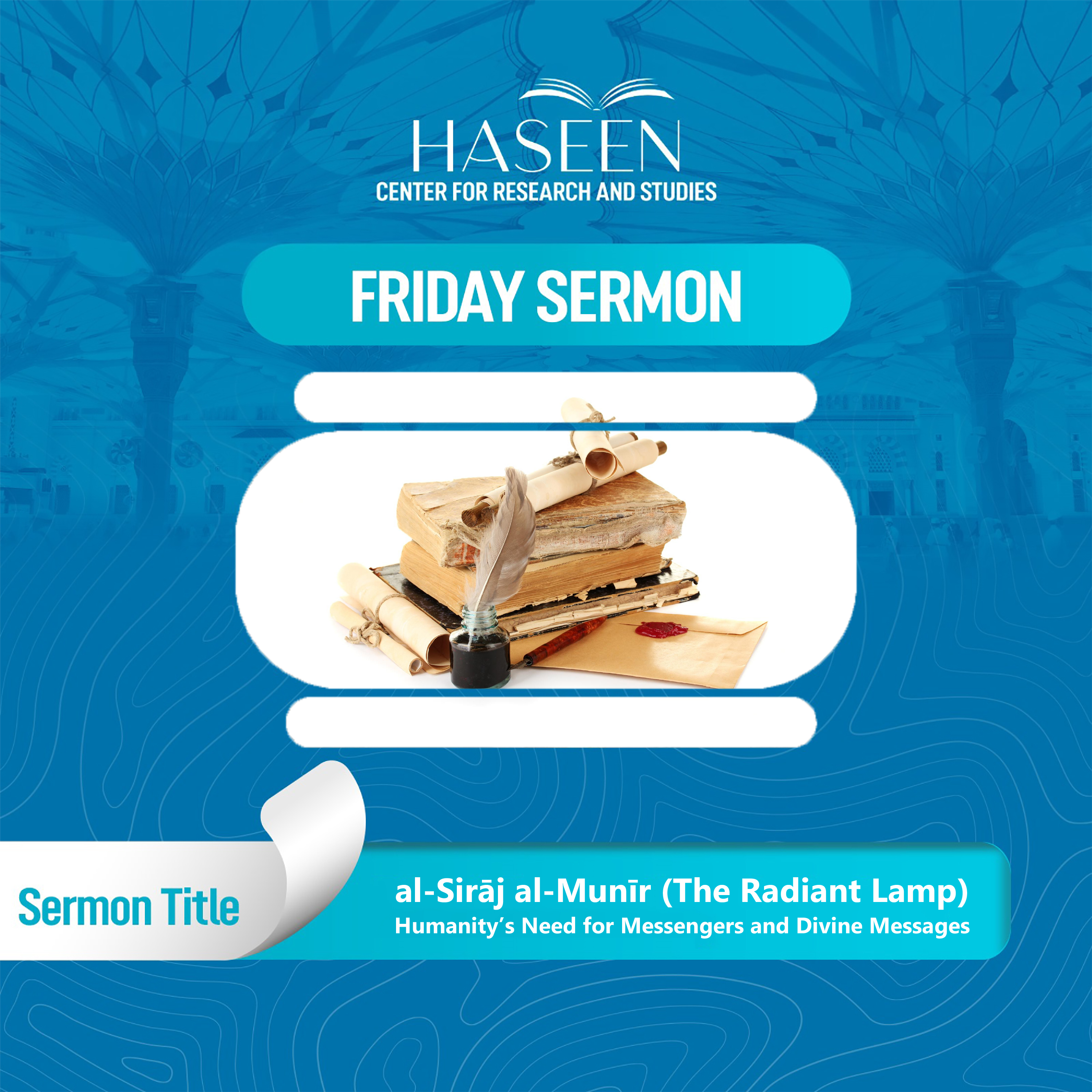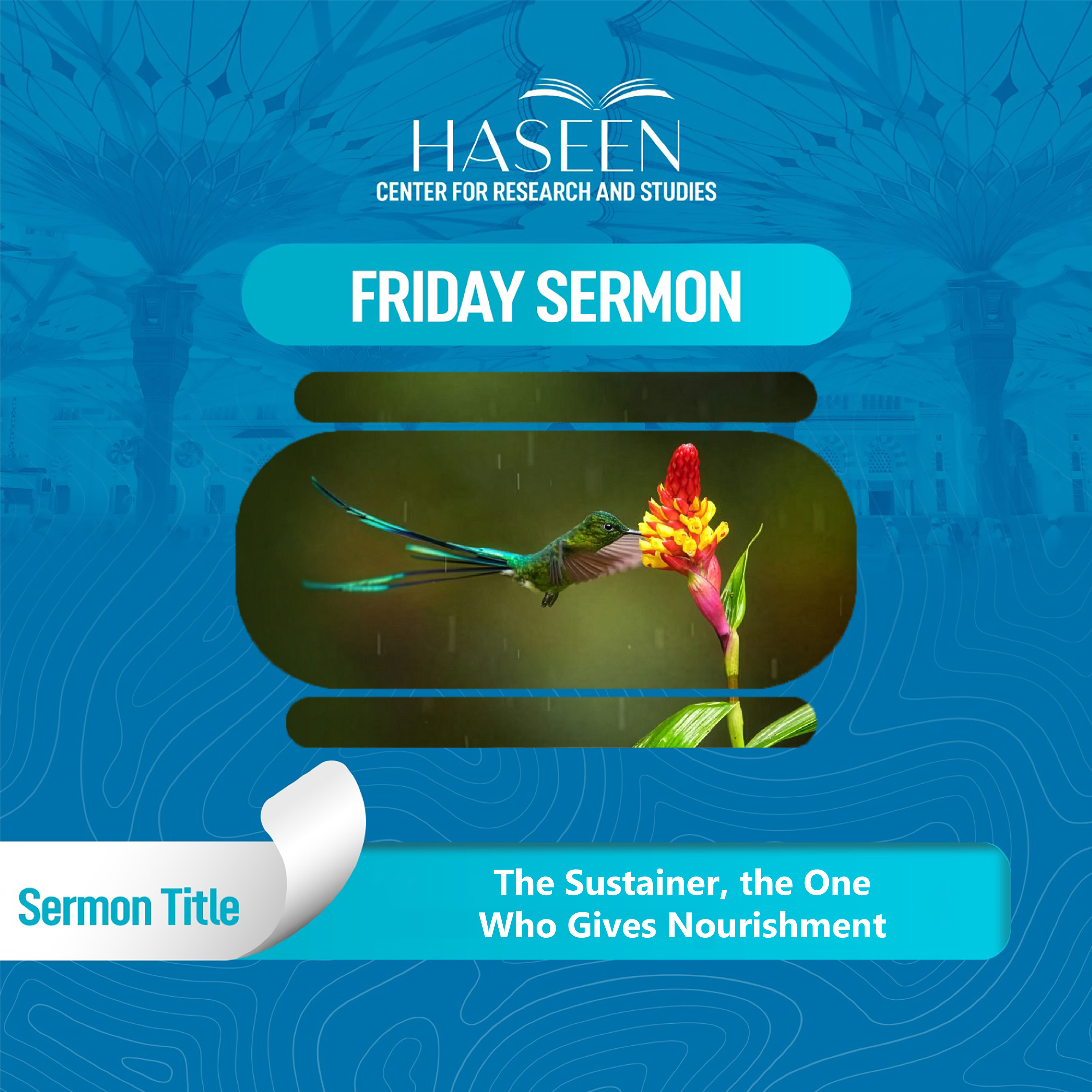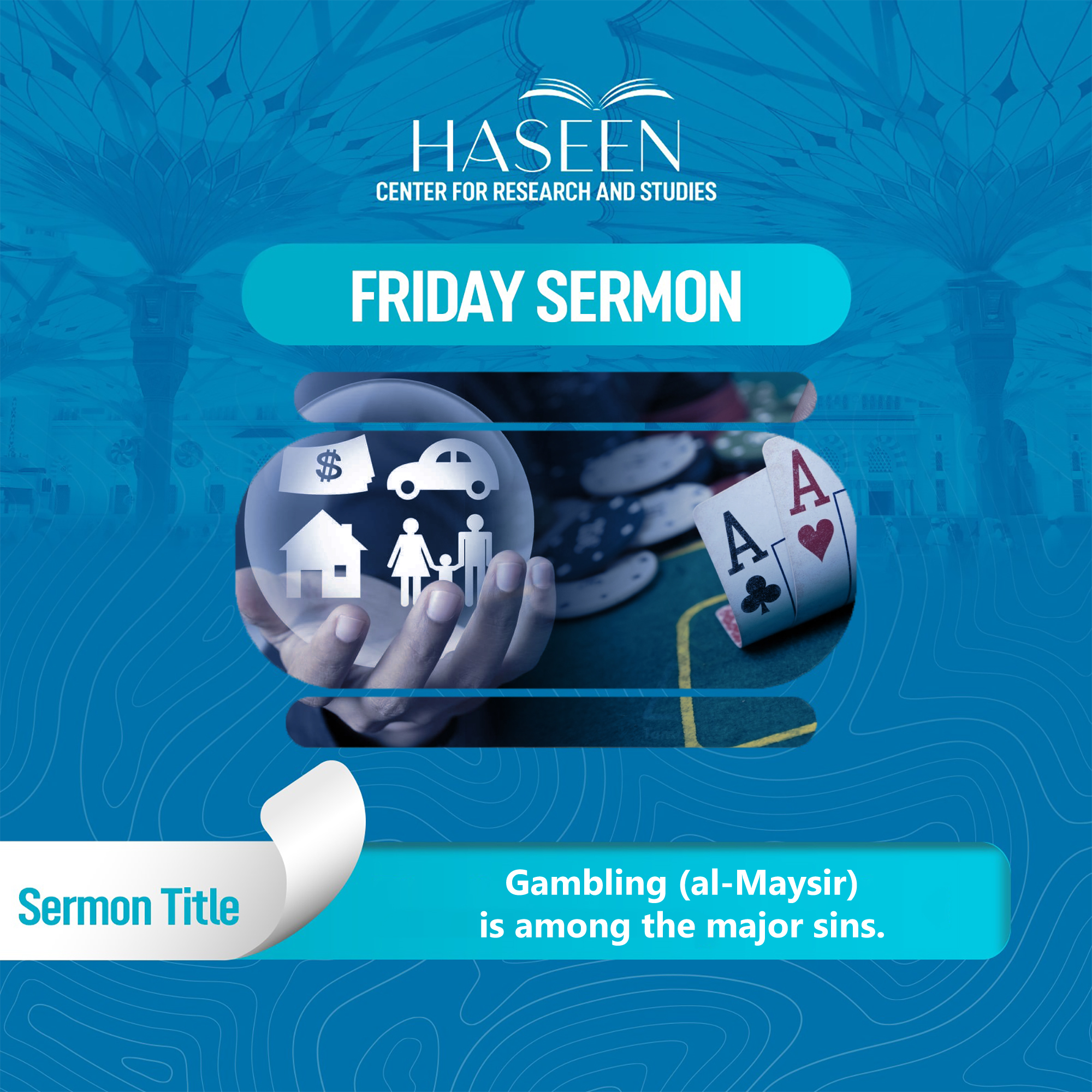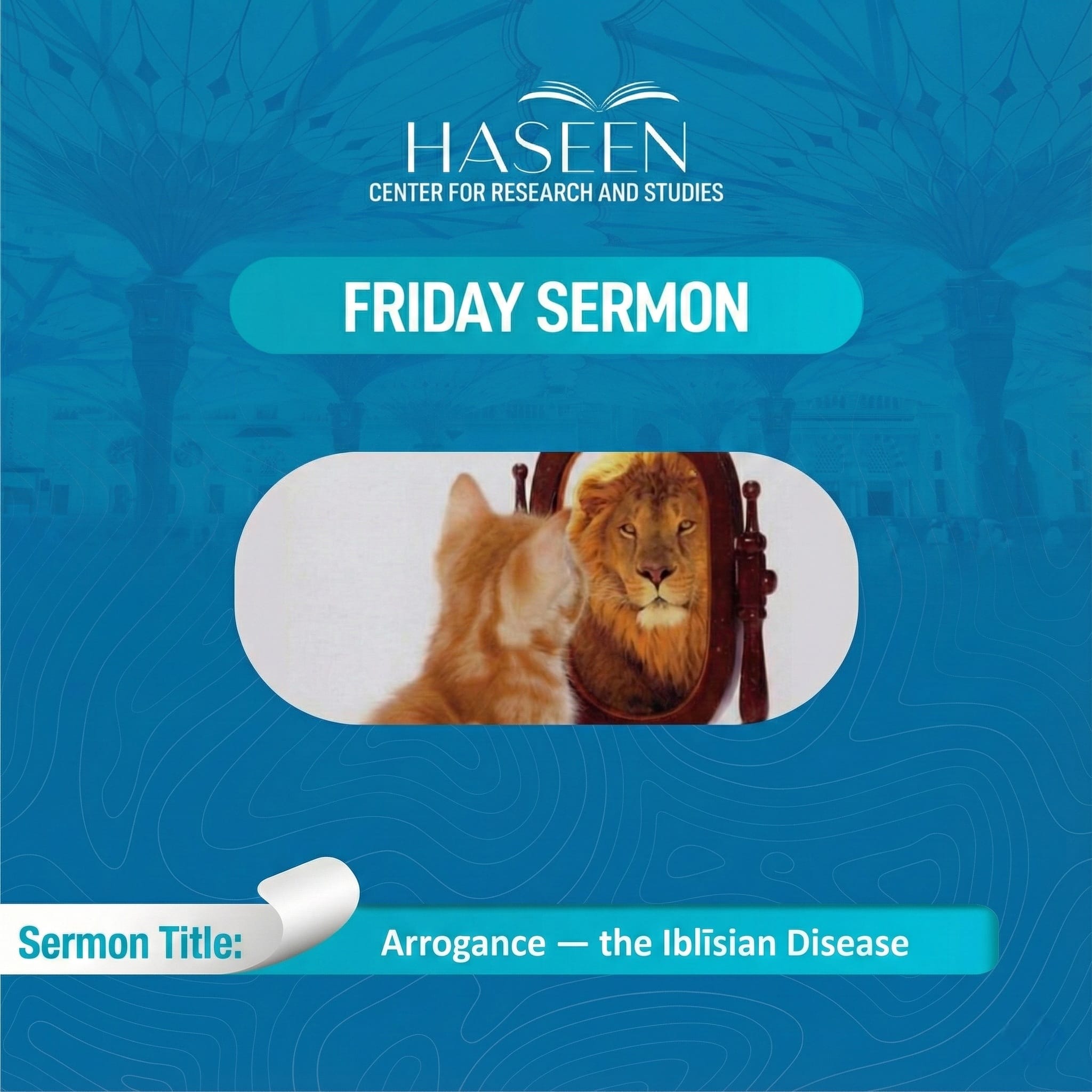Title of the Sermon: The Qur’an, the Eternal Miracle
Elements of the Sermon:
The polytheists’ acknowledgment of the Qur’an’s miraculous nature.
The Qur’an as the Prophet’s greatest sign.
The various aspects of the Qur’an’s miracle.
All praise be to Allah, the Most Merciful, the Most Compassionate, Who taught the Qur’an, revealed the Criterion (Al-Furqān), and made it a guidance for both mankind and the jinn. I bear witness that there is no deity except Allah alone, without any partner, and I bear witness that Muhammad is His servant and Messenger. May Allah send abundant peace and blessings upon him.
Thereafter, fear Allah, O servants of Allah, with true piety and be ever mindful of Him in secret and in private, as He has enjoined:
يا أَيُّهَا الَّذِينَ آمَنُوا اتَّقُوا اللَّهَ حَقَّ تُقَاتِهِ وَلَا تَمُوتُنَّ إِلَّا وَأَنْتُمْ مُسْلِمُونَ
“O you who believe, fear Allah as He should be feared and do not die except as Muslims.” [Ᾱlu ‘Imrān: 102]
O servants of Allah,
One day, Al-Waleed ibn al-Mughirah—one of the foremost stalwarts of disbelief in Mecca—came to the Prophet (ﷺ) and recited the Qur’an to him. It was as if the recitation had softened his heart. Then Abu Jahl spoke up to defame the Qur’an. But Allah caused the Prophet’s recitation to express what the disbelievers were trying to conceal. He said: “And what shall I say? By Allah, not one of you is more learned in poetry than I, nor do you know its cadence or its composition, nor the poetry of the jinn. By Allah, nothing that is uttered in praise of it has any likeness, and by Allah, its words, though they may sound sweet, carry with them both brilliance and yielding power—they soar high and yet humble that which lies beneath them.” (Narrated by Al-Hakim)
Just as Abu al-Waleed ‘Utbah ibn Rabi‘ah of Quraysh, upon hearing the Qur’an, said: “I have heard a speech like nothing I have ever heard before. By Allah, it is neither poetry, nor magic, nor the work of soothsayers. By Allah, its account is unmatched.” (Narrated by Al-Bayhaqi)
This very same statement was made by Ja‘far ibn Abi Talib when he addressed the Negus regarding the Messenger (ﷺ), describing him: “There is no revelation upon us like none other; we verified it, we believed in it, and we knew that what he brought was the truth from Allah.” (Narrated by Ishaq ibn Rahawiyah)
The Qur’an is the Word of Allah, the eternal sign, and the conclusive proof for the Prophet (ﷺ). It is the greatest discourse of Allah, full of majesty and perfection; indeed, there is nothing comparable to Him. His speech is unlike the speech of any of His creation—it carries the attributes of perfection, majesty, and greatness. It is flawless, without any deviation or crookedness; it is the clear, unmistakable truth, untouched by falsehood from before or behind it.
Allah, exalted be He, never sent a messenger without supporting him with clear signs that testified to his truthfulness and prophethood, as He says:
لَقَدْ أَرْسَلْنَا رُسُلَنَا بِالْبَيِّنَاتِ
“Indeed, We sent Our messengers with clear proofs…” [Al-Hadīd: 25]
And as for the Seal of the Prophets, Muhammad (ﷺ), Allah granted him the most dazzling, eternal, abiding sign—the great Qur’an.
The Prophet (ﷺ) said: “There is no prophet except that he was given something similar to it, which people believed in. And truly, that which I was given is what Allah revealed to me, and I hope that on the Day of Resurrection I shall be among the most devout followers.” (Narrated by al-Bukhari and Muslim)
The Noble Qur’an is a miraculous Book. With it, Allah challenged both mankind and the jinn to produce something like it—be it one surah, or even ten surahs like it—and they were unable, nor will they ever be able, for the challenge remains until the Day of Resurrection. He says:
قُلْ لَئِنِ اجْتَمَعَتِ الْإِنْسُ وَالْجِنُّ عَلَى أَنْ يَأْتُوا بِمِثْلِ هَذَا الْقُرْآنِ لَا يَأْتُونَ بِمِثْلِهِ وَلَوْ كَانَ بَعْضُهُمْ لِبَعْضٍ ظَهِيرًا
“Say, if mankind and the jinn gathered to produce the like of this Qur’an, they could not produce the like of it, even if they were helpers to one another.” [Al-Isrā: 88]
Why is the Qur’an considered miraculous? And how did the Arabs—those renowned paragons of eloquence and rhetoric—fail to produce even a single surah comparable to it?
The Prophet (ﷺ) was among the noblest of Arabs in lineage and character, the truest in his dialect and the most trustworthy in his integrity—even though he was illiterate, neither reading nor writing, and had no teacher. Yet Allah described him thus:
وَمَا كُنْتَ تَتْلُو مِنْ قَبْلِهِ مِنْ كِتَابٍ وَلَا تَخُطُّهُ بِيَمِينِكَ إِذًا لَارْتَابَ الْمُبْطِلُونَ
“And you did not recite before it any book, nor did you inscribe one with your right hand, so the falsifiers would have been in doubt.” [Al-‘Ankabūt: 48]
Then he would go forth and recite a Book in the highest degree of eloquence—a clear criterion between truth and falsehood—informing them that it was indeed the Word of Allah, by which He challenged both man and jinn, and affirming that he was the Messenger of Allah to all the worlds. Thus, they would be struck like falling thunder, standing before its verses in submission, acknowledging that it is an overwhelming miracle, and that nothing they know resembles the Qur’an—neither in its wording nor in its meaning.
The Qur’an is miraculous in its diction and arrangement, in its meanings, in its news (ahdath), and in its legislation.
As for its miracle in diction and arrangement, it is in a clear, eloquent Arabic—a language in which its words are of the utmost clarity and expression, unlike anything before it. It is neither poetry nor prose; it is something altogether different. A single word in it combines sweetness with grandeur, eloquence with rhetoric, and then its words are arranged in a structured chain, like a finely woven necklace of pearls and rubies.
One Bedouin heard Allah’s command:
فَاصْدَعْ بِمَا تُؤْمَرُ وَأَعْرِضْ عَنِ الْمُشْرِكِينَ
“So, proclaim what you are commanded and turn away from the polytheists.” [Al-Hijr: 94]
and, overwhelmed by its eloquence, he fell into prostration exclaiming, “I have prostrated—for its eloquence!”
Reflect upon what that verse did to your heart, as Allah says:
وَقِيلَ يَاأَرْضُ ابْلَعِي مَاءَكِ وَيَاسَمَاءُ أَقْلِعِي وَغِيضَ الْمَاءُ وَقُضِيَ الْأَمْرُ وَاسْتَوَتْ عَلَى الْجُودِيِّ وَقِيلَ بُعْدًا لِلْقَوْمِ الظَّالِمِينَ
“And it was said, "O earth, swallow your water, and O sky, withhold [your rain]." And the water subsided, and the matter was accomplished, and the ship came to rest on the [mountain of] Judiyy. And it was said, "Away with the wrongdoing people.’” [Hūd: 44]
The Qur’an has reached perfection from its beginning to its end; you will find in it no defect, no shortcoming, no error, nor any need for amendment—just as Allah says:
أَفَلَا يَتَدَبَّرُونَ الْقُرْآنَ وَلَوْ كَانَ مِنْ عِنْدِ غَيْرِ اللَّهِ لَوَجَدُوا فِيهِ اخْتِلَافًا كَثِيرًا
“Do they not reflect upon the Qur’an? Had it been from other than Allah, they would have found within it much discrepancy.” [Al-Nisā: 82]
And as for the miracle in its meanings, it is the greatest and most manifest miracle, for Allah challenged both the Arabs and the non-Arabs with this glorious Qur’an.
The Qur’an gathers within it noble meanings—meanings that no human could possibly know in their entirety except by divine revelation. It is a majestic discourse about Allah, His names and attributes; about the true God and the proofs that attest to Him; about the Resurrection after death and the scenes of the Hereafter as clear as if seen by the eye; about the angels and the prophets; about the vast universe and its splendid signs in the horizons; about mankind, his creation, and the purpose of his existence; about the methodology by which a man achieves righteousness and a pleasant life; and about those who have been guided and enriched by His guidance, as well as those who went astray and followed their whims.
It is a truth that contains no contradiction or inconsistency, and its narration is a truthful account that conforms with the sound natural disposition that knows Allah in His perfection and beauty.
As for the miracle in its historical news, it tells of past events with true and precise narration, detailing events as though the Prophet (ﷺ) had witnessed them himself. How could an illiterate man—one who neither reads nor writes—relate to people the story of Noah and the flood, of ‘Aad and tyrannical oppression, of Thamud and the people of Shu‘ayb, or of Lot’s people? How could he recount the story of the People of the Cave, of Dhul-Qarnayn, of Talut and Goliath—in such detailed narration that nothing ever contradicts it throughout the ages?
It tells of Joseph and his brothers—a wondrous narrative known only to the knower of the unseen and the witness—where Allah says:
ذَلِكَ مِنْ أَنْبَاءِ الْغَيْبِ نُوحِيهِ إِلَيْكَ وَمَا كُنْتَ لَدَيْهِمْ إِذْ أَجْمَعُوا أَمْرَهُمْ وَهُمْ يَمْكُرُونَ
“This is part of the news of the unseen which We reveal to you, and you were not with them when they conspired.” [Yūsuf: 102]
It recounts the story of Moses, Pharaoh, and the Children of Israel, and what befell them. How, then, did the Messenger of Allah (ﷺ) know all this, when he neither knew the Hebrew scriptures nor their people, except by the revelation of Allah, who said:
وَمَا كُنْتَ بِجَانِبِ الْغَرْبِيِّ إِذْ قَضَيْنَا إِلَى مُوسَى الْأَمْرَ وَمَا كُنْتَ مِنَ الشَّاهِدِينَ * وَلَكِنَّا أَنْشَأْنَا قُرُونًا فَتَطَاوَلَ عَلَيْهِمُ الْعُمُرُ وَمَا كُنْتَ ثَاوِيًا فِي أَهْلِ مَدْيَنَ تَتْلُو عَلَيْهِمْ آيَاتِنَا وَلَكِنَّا كُنَّا مُرْسِلِينَ * وَمَا كُنْتَ بِجَانِبِ الطُّورِ إِذْ نَادَيْنَا وَلَكِنْ رَحْمَةً مِنْ رَبِّكَ لِتُنْذِرَ قَوْمًا مَا أَتَاهُمْ مِنْ نَذِيرٍ مِنْ قَبْلِكَ لَعَلَّهُمْ يَتَذَكَّرُونَ
And you were not on the western side [of the mount] when We decreed to Moses the command, and you were not among the witnesses. But We raised [for you] generations, and prolonged their life; and you were not present among the people of Midian as they recited Our verses, but We were sending [messengers]. And you were not on the side of the mount when We called, but [it was] a mercy from your Lord that you might warn a people to whom no warner had come before you…” [Al-Qassas: 44–46]
Among the greatest miracles in its news is its account of events in the near future. Knowing that many will deny it, the Qur’an recites verses foretelling the victory of the Romans in a few years. It says:
غُلِبَتِ الرُّومُ * فِي أَدْنَى الْأَرْضِ وَهُمْ مِنْ بَعْدِ غَلَبِهِمْ سَيَغْلِبُونَ * فِي بِضْعِ سِنِينَ لِلَّهِ الْأَمْرُ مِنْ قَبْلُ وَمِنْ بَعْدُ وَيَوْمَئِذٍ يَفْرَحُ الْمُؤْمِنُونَ
“The Romans have been defeated in the nearest land. But they, after their defeat, will overcome in a few years. The command, before and after, is for Allah. And on that day the believers will rejoice.” [Quran 30:2–4]
Thus, the challenge remains, and events will unfold as foretold.
The Qur’an informs them that Abu Lahab will be bound to a blazing fire—meaning that he will die a disbeliever, never to rise (even by deception) to deny the Qur’an, but rather he will perish, utterly disgraced.
Among the miracles in its news is also that which relates scientific facts of astounding precision and clarity—facts that modern scholars have only recently confirmed. Listen to it, and it will inform you with knowledge about the stages of embryonic creation, saying:
وَلَقَدْ خَلَقْنَا الْإِنْسَانَ مِنْ سُلَالَةٍ مِنْ طِينٍ * ثُمَّ جَعَلْنَاهُ نُطْفَةً فِي قَرَارٍ مَكِينٍ * ثُمَّ خَلَقْنَا النُّطْفَةَ عَلَقَةً فَخَلَقْنَا الْعَلَقَةَ مُضْغَةً فَخَلَقْنَا الْمُضْغَةَ عِظَامًا فَكَسَوْنَا الْعِظَامَ لَحْمًا ثُمَّ أَنْشَأْنَاهُ خَلْقًا آخَرَ فَتَبَارَكَ اللَّهُ أَحْسَنُ الْخَالِقِينَ
“And certainly, We created man from an extract of clay. Then We placed him as a drop of sperm in a safe lodging. Then We made the sperm into a clot, then We made the clot into a lump, and We covered the lump with bones, then We clothed the bones with flesh; then We developed him into another creation. So blessed is Allah, the Best of Creators!” [Al-Mu’minūn: 12–14]
How could the Messenger of Allah (ﷺ), the Arabs, or the non-Arabs at that time know of such detailed expression and elaboration?
It also tells of what recent science has confirmed—for example, that the fresh water of the Euphrates does not mix with the salty water of the sea. It says:
وَهُوَ الَّذِي مَرَجَ الْبَحْرَيْنِ هَذَا عَذْبٌ فُرَاتٌ وَهَذَا مِلْحٌ أُجَاجٌ وَجَعَلَ بَيْنَهُمَا بَرْزَخًا وَحِجْرًا مَحْجُورًا
“And it is He who has let free the two seas, one fresh and sweet, and one salty and bitter, and He has set a barrier and a prohibiting partition between them.” [Al-Furqān: 53]
This is a confirmation of His statement:
سَنُرِيهِمْ آيَاتِنَا فِي الْآفَاقِ وَفِي أَنْفُسِهِمْ حَتَّى يَتَبَيَّنَ لَهُمْ أَنَّهُ الْحَقُّ
“We will show them Our signs in the horizons and within themselves until it becomes clear to them that it is the truth.” [Fussilat: 53]
And as for the miracle in its legislation, it is a Book of life—sent down by Allah as a complete, governing system by which the religion and the world are perfected. Its title states:
إِنَّ هَذَا الْقُرْآنَ يَهْدِي لِلَّتِي هِيَ أَقْوَمُ
“Indeed, this Qur’an guides to that which is most suitable.” [Al-Isrā: 9]
Within it, you see rulings on acts of worship and transactions—verses concerning buying and selling, leasing and pledging; it forbids usury and gambling, and prohibits corruption and exaggeration in weighing. It organizes social life, establishes the rulings on marriage, divorce, maintenance—and even governs breastfeeding with clear verses.
It lays down the foundations of governance, politics, and justice—all with fairness and mercy—promising blessings and goodness to those who adhere to its rulings. Then the days and years pass, and the Muslims implement its laws and legislation; Allah raises their station and makes them the rulers of the world as He promised. Yet as time goes on, many of its legislations may be neglected in life, and people will reap only hardship and humiliation. Is this not a confirmation of Allah’s promise and warning in the Qur’an, as He says:
فَإِمَّا يَأْتِيَنَّكُمْ مِنِّي هُدًى فَمَنِ اتَّبَعَ هُدَايَ فَلَا يَضِلُّ وَلَا يَشْقَى * وَمَنْ أَعْرَضَ عَنْ ذِكْرِي فَإِنَّ لَهُ مَعِيشَةً ضَنْكًا
“So, either there comes to you guidance from Me, and whoever follows My guidance will neither go astray nor suffer, or whoever turns away from My remembrance will have a life of hardship.” [Ta Ha: 123–124]
May Allah bless me and you in the great Qur’an and benefit us with its verses and wise reminders. I ask Allah’s forgiveness for myself and for you—so seek His forgiveness, for He is the Oft-Forgiving, Most Merciful.
Second Sermon
All praise be to Allah, and may prayers and peace be upon the Messenger of Allah, his family, his companions, and those who follow him.
Have you ever heard of the awe and majesty of the Qur’an, its overwhelming authority? By Allah, it is so because of its miraculous nature and its conclusive proofs! It is as if I, standing with the Prophet (ﷺ) while he recited its verses, heard them with the heart of Jubayr ibn Mat‘am—a man who was then a disbeliever—exclaiming: “My heart nearly took flight!” (Narrated by al-Bukhari)
Its verses have shattered the hearts of the sincere People of the Book; they are so moved that upon hearing them they prostrate, weeping in humility, just as Allah says:
إِذَا يُتْلَى عَلَيْهِمْ يَخِرُّونَ لِلْأَذْقَانِ سُجَّدًا * وَيَقُولُونَ سُبْحَانَ رَبِّنَا إِنْ كَانَ وَعْدُ رَبِّنَا لَمَفْعُولًا * وَيَخِرُّونَ لِلْأَذْقَانِ يَبْكُونَ وَيَزِيدُهُمْ خُشُوعًا
“When it is recited to them, they fall down in prostration, and they say, ‘Exalted is our Lord! If our Lord’s promise were to be fulfilled, would we not be among the witnesses?’ And they fall down in prostration, weeping, and it increases their humility.”
— [Quran 17:107–109]
It is as if I were with the truthful Abu Bakr (may Allah be pleased with him) who had built a small mosque in the courtyard of his house, where he would pray and recite the Qur’an. And there, the polytheists’ women and their children would stand, admiring and gazing at him. This sight even caused some of the elite of Quraysh from among the polytheists to be alarmed. (Narrated by al-Bukhari)
Truly, the miracle lies in its words and meanings, in its historical accounts, in its rulings and legislation, in its discourse on the unseen, and in those scientific truths that are confirmed day after day—truths denied only by the unjust. When you hear its verses, you become convinced, as Allah says:
وَمَا كَانَ هَذَا الْقُرْآنُ أَنْ يُفْتَرَى مِنْ دُونِ اللَّهِ وَلَكِنْ تَصْدِيقَ الَّذِي بَيْنَ يَدَيْهِ وَتَفْصِيلَ الْكِتَابِ لَا رَيْبَ فِيهِ مِنْ رَبِّ الْعَالَمِينَ
“And this Qur’an is not fabricated from other than Allah; rather, it is the confirmation of what is [already] before it and a detailed explanation of the Book—there is no doubt in it from the Lord of the worlds.” [Yūnus: 37]
O Allah, make the Qur’an the spring of our hearts, the light of our bosoms, the remover of our sorrows, and the dispeller of our worries. O Allah, make us among those who truly exalt the Qur’an, who uphold its letters, reflect upon its meanings, preserve its limits, act upon its teachings, and recite it in the manner prescribed.
O Allah, bless us in Ramadan and help us excel in prayer, fasting, and the recitation of the Qur’an; and accept from us, O Most Merciful.
O Allah, support Islam and exalt the Muslims; destroy the criminal Jews, and save Your oppressed servants.
O Allah, grant us security in our homelands, reform our leaders and those entrusted with our affairs, and make our allegiance be with those who fear You, are mindful of You, and follow Your pleasure.
Our Lord, grant us goodness in this world and goodness in the Hereafter, and protect us from the torment of the Fire.


